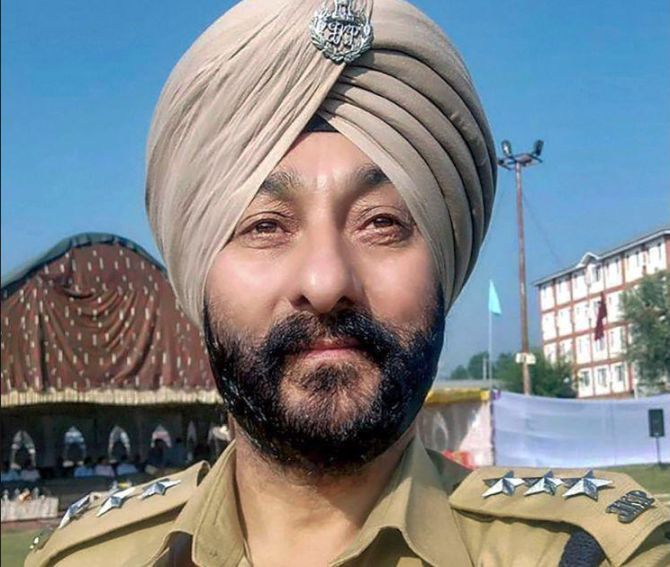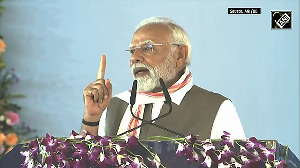Why did RA&W hire a man with a questionable record, wonders David Devadas.

A big question hangs untidily from l'affaire Davinder Singh, and it is this: Just how badly placed are India's intellitgence agencies with regard to information and intelligence on Kashmir?
First, we were told that the Jammu and Kashmir police discovered that now suspended deputy superintendent of police Davinder Singh's links with Hizbul Mujahideen militants by tapping phones.
Then we were told that India's external intelligence agency, the Research and Analysis Wing, had turned to Davinder to get them intelligence on militants because the phones had been shut down in Kashmir -- and that this had cut off the agencies from raw, ground-level information!
R&AW recruited him in October 2019, we are told -- but for an operation in Pakistan, not for local intelligence.
In the same breath, we are told that R&AW was not monitoring Davinder Singh, and so did not know that he was ferrying top terrorists to Jammu and Delhi.
Even during the blanket ban on communication, a few phones, such as those of police officers such as Davinder Singh, were 'whitelisted' -- they worked. His calls could have been monitored.
The enormity of the security snafu cannot be overstated.
For, when his own force (the J-K police) arrested him on January 11, Davinder Singh was transporting wanted terrorists in his car. They were heading down the highway out of the Kashmir valley, towards Jammu and the rest of India.
That was a mere fortnight before Republic Day, one of the most tense times for security agencies, and also just three weeks before the crucial Delhi assembly election.
Immediately after his arrest, eyebrows had already been raised sky-high since Afzal Guru, who was hanged in 2013 for being part of the conspiracy to attack Parliament in 2001, had named Davinder Singh in an affidavit as the one who tortured and blackmailed him into participating in that horror.
Speculation was rife: Could the men Davinder Singh was driving through Kashmir have been going for some horrendous act of similar proportions?
If so, how large was the conspiracy?
Was he a lone rogue officer, or was there a larger ring?
Were others within the state apparatus involved?
Davinder Singh, who rose through the ranks to be a deputy superintendent of police over the past three decades, is said to have engaged in smuggling and other nefarious activities while he was part of the Jammu-Kashmir police's infamous Special Operations Group, which is meant for counter-terror operations.
One thing was certain. Any agency that had institutional memory, or had the resources for research, would have known that Davinder Singh was no newcomer to underhand, covert operations, possibly even ones with cross-border repercussions.
In that light, one ought to be extremely concerned if our most hush-hush agency of all would hire a man with such a record, and not even keep him under strict surveillance for at least the first few months after taking him on.
This matter not only keeps getting murkier, it gets scarier!
There seems to be cause for concern not only about the efficiency and competence of major intelligence agencies, but also their ability to source information adequately.
It has been quite obvious since the constitutional changes with regard to Jammu and Kashmir that Pakistan is not willing to accept it. It even downgraded diplomatic ties and suspended trade with India after those changes.
While there has been relatively little reaction on the ground in Kashmir, several well-placed observers are convinced that a reaction has only been postponed, that it will be engineered -- possibly this spring or summer, or by 2021.
A compromised, or even collapsed, information network sounds especially ominous at such a time.
Of course, the agencies have a record of being breathtakingly remiss. They had no idea what was going on in 1989, and when militant commander Burhan Wani was killed in 2016 -- even though several well-informed Kashmiris were aware in the preceding weeks that unrest was in the offing.
After this terribly worrying arrest, the extended suspension of the Internet connectivity over the past several months should be closely reviewed. L'affaire Davinder indicates that it has been at least partly counter-productive.
On the one hand, it has caused international criticism of India. On the other, information about the whereabouts of militants seems to have dried up to a large extent.
David Devadas is the author of The Story of Kashmir and The Generation of Rage.










